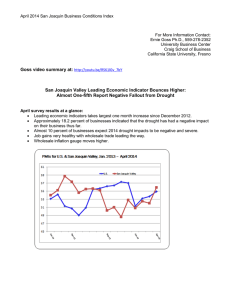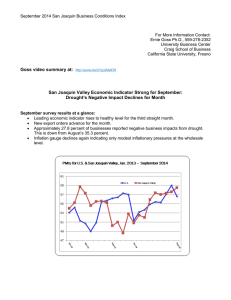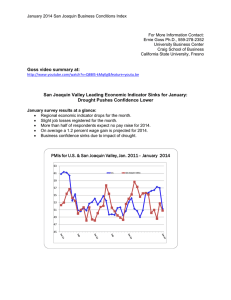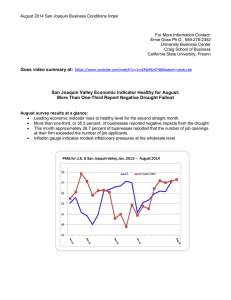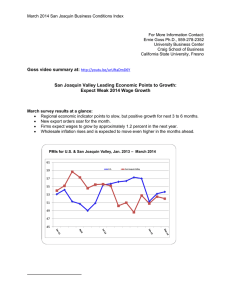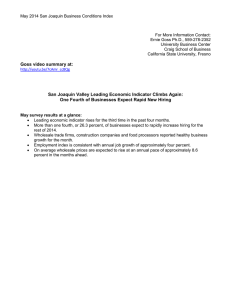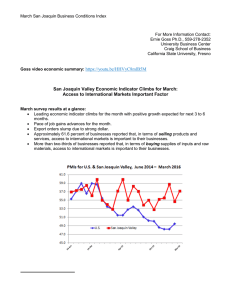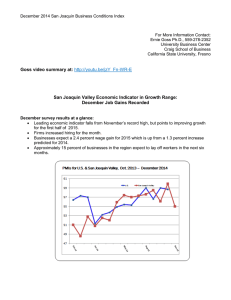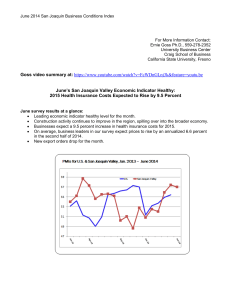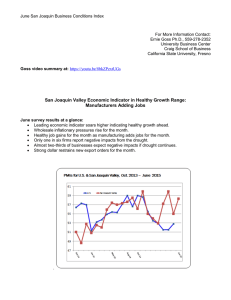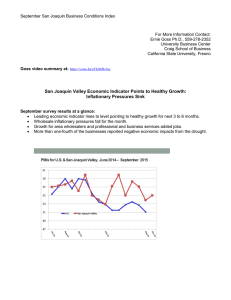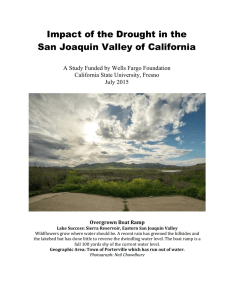Document 13092150
advertisement
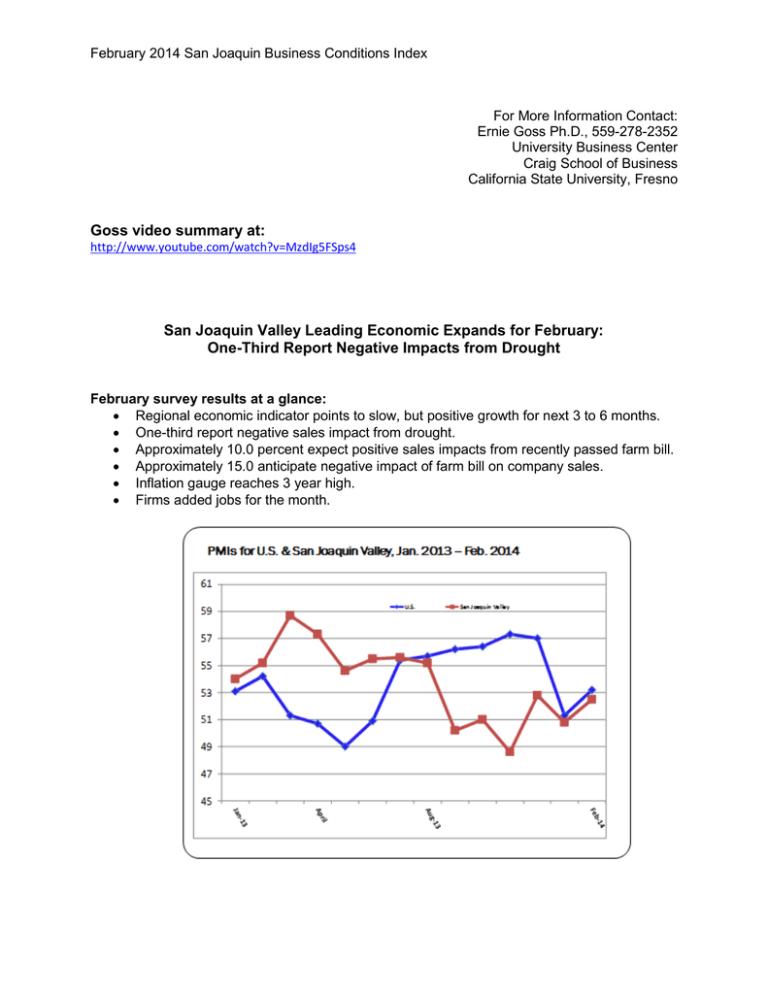
February 2014 San Joaquin Business Conditions Index For More Information Contact: Ernie Goss Ph.D., 559-278-2352 University Business Center Craig School of Business California State University, Fresno Goss video summary at: http://www.youtube.com/watch?v=MzdIg5FSps4 San Joaquin Valley Leading Economic Expands for February: One-Third Report Negative Impacts from Drought February survey results at a glance: Regional economic indicator points to slow, but positive growth for next 3 to 6 months. One-third report negative sales impact from drought. Approximately 10.0 percent expect positive sales impacts from recently passed farm bill. Approximately 15.0 anticipate negative impact of farm bill on company sales. Inflation gauge reaches 3 year high. Firms added jobs for the month. San Joaquin Business Conditions Index – p. 2 of 3 For Immediate Release: March 3, 2014 FRESNO, CA-For the fourteenth time in the past fifteen months, the San Joaquin Valley Business Conditions Index rose above the 50.0 threshold. The index, a leading economic indicator from a survey of individuals making company purchasing decisions for firms in the counties of Fresno, Madera, Kings and Tulare, points to positive but slow growth for the next 3 to 6 months. The index is produced using the same methodology as that of the national Institute for Supply Management (www.ism.ws). Overall Index: The index advanced to 52.5 from 50.8 in January. An index greater than 50 indicates an expansionary economy over the course of the next three to six months. Survey results for the last two months and one year ago are listed in the accompanying table. “Construction firms and value-added business services firms continue to report slowly improving business conditions. On the other hand, the negative impacts from the drought are growing. This month we asked the impact of the drought on company sales. Approximately one-third of the businesses reported that the drought has had negative impacts on sales. The remaining two-thirds of businesses reported little or no impacts of the drought on company sales,” said Ernie Goss, Ph.D., research faculty with the Craig School of Business at California State University, Fresno. Employment: After moving below growth for January, the hiring gauge rose above the 50.0 threshold for February. The job index climbed to 54.1 from 49.5 in January. “Manufacturers continue to expand production by increasing the productivity and hours worked of current employees. On the other hand, value-added business service firms are adding jobs at a healthy pace. As in past months, firms in the region continue to increase output via temporary employment,” reported Goss. This month managers and owners in the region assessed how the recently passed farm bill would likely affect company sales. Approximately 10.0 percent expect positive impacts while 15.0 percent anticipate negative impacts. The remaining 75.0 percent expect little or no sales impacts from the recently passed farm bill. Wholesale Prices: The prices-paid index, which tracks the cost of purchased raw materials and supplies, increased for the month. The wholesale inflation gauge climbed from January’s 66.4 to 71.9 for February. San Joaquin Business Conditions Index – p. 3 of 3 "Inflation at the wholesale level is clearly moving higher. The national price gauge and our regional reading are now at their highest level in three years. While the Federal Reserve has announced it intends to scale back its bond buying program, termed QE3, by another $10 billion in March, I expect the Fed to begin scaling this program more aggressively in the months ahead as inflationary pressures at the wholesale level rise at a somewhat faster pace,” said Goss. Business Confidence: Looking ahead six months, economic optimism, captured by the business confidence index, slumped to 48.0 from January’s 48.4. “Businesses, especially those linked to agriculture, are experiencing negative impacts from the drought. The drought is driving business confidence lower,” said Goss. Inventories: Businesses expanded inventories of raw materials and supplies for the month as the reading moved above growth neutral. The February inventory reading rose to 52.8 from 48.1 in January. Trade: The new export order reading dipped to 45.1 from January’s 45.2. The regional import reading for February rose to 58.1 from January’s 52.6. Other components: Other components of the February Business Conditions Index were new orders at 50.1, down from 50.3 in January; production or sales at 48.5, down from January's 49.3; and delivery lead time at 57.1 which was unchanged from January. Table 1 details survey results for February 2013, last month and February 2014. March survey results will be released on the first business day of next month, April 1. Table 1: Overall and component indices for last 2 months and one year ago (above 50.0 indicates expansion) San Joaquin Valley February 2013 January 2014 February 2014 Leading economic indicator 55.2 50.8 52.5 New orders 58.1 50.3 50.1 Production or sales 55.6 49.3 48.5 Employment 51.1 49.5 54.1 Inventories 51.3 48.1 52.8 Delivery lead time 59.6 57.1 57.1 Wholesale prices 66.0 66.4 71.9 Imports 51.9 52.6 58.1 Export orders 44.2 45.2 45.1 Business confidence 43.6 48.4 48.0 Craig School of Business: http://www.craig.csufresno.edu/ Follow Goss: Twitter at http://twitter.com/erniegoss or www.ernestgoss.com Blog: http://economictrends.blogspot.com
